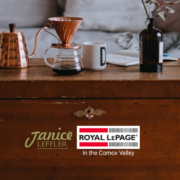According to a survey conducted this year by Royal LePage, 83% of 18 to 38-year-olds in British Columbia believe that home ownership is a worthwhile investment. Of those who are not yet homeowners, 77% say they plan to purchase a primary residence in their lifetime. Even though they realize it is expensive to own a home, it is a priority for them.
The positive association with owning real estate amongst the younger generation was not altogether unexpected. What is surprising and promising is the practical and purposeful way they are tackling the affordability barriers.
They are focused on saving for a down payment which is often the most difficult hurdle buyers face.
Purchasing in larger urban markets like Vancouver might not be attainable. However, smaller markets such as the Comox Valley may reap the benefits. The overall sentiment from this demographic is that owning their home, regardless of the property type, is a valuable and worthwhile long-term investment.
To achieve this, they are willing to make lifestyle adjustments or find alternative ways to enter the market. This may include purchasing with friends or family. It may mean buying a property with the intention of renting part of it to a tenant. It can even mean relocating to more affordable areas.
For many of these young buyer hopefuls, current higher lending rates are a major barrier. Keeping potential buyers in the rental market longer.
Now that rates are edging lower, we may begin to see more of these potential homeowners move away from renting and into purchasing.
Among respondents in British Columbia who do not currently own a primary residence, 75% say that owning a home is a priority. Approximately half of all who responded (51%) really believe this is an achievable goal. The other 49% are split between being unsure whether they will be able to buy and those who are convinced they will not be able to own a home.
When asked why the goal of home ownership is important to them, the vast majority say they would like their own permanent place to live. Other factors they consider are the stability of owning and the restrictive landlord-tenant policies when renting.
Homeownership is a highly valued milestone for many in the Generation Z and young millennial demographic. This makes it a key priority for their future.
While some young buyers expect to receive financial assistance from their families, others are assessing their finances and making the necessary adjustments to reach their goals. They are doing a thorough analysis of their income and spending habits, and are cutting back on expenses where possible.
Remember that opportunities exist in every market. Don’t feel pressured to act immediately. Take the time to ask questions, understand, and become comfortable with the opportunities available to you.
I am here to help you with that goal and explain some of the options and possible solutions. Get in touch today!
Summary
● The Royal LePage® 2024 Demographic Survey on the Next Generation of Buyers revealed
that 84% of respondents nationally believe in home ownership as a worthwhile investment,
with variations across provinces. 1
● 51% of respondents nationally currently own their primary residence, while 35% are renting
and 13% are living rent-free.
● 74% of non-homeowners consider owning a home a lifetime priority, citing reasons such as
seeking stability and financial benefits. 2
● 54% of those prioritizing home ownership believe it is achievable, with 20% thinking it is not
achievable.
● 75% of those prioritizing home ownership plan to purchase a home in their lifetime, with
varying timelines for purchase, including 40% aiming to buy within the next 5 to 10 years. 3
● The Home Purchase Survey by Hill & Knowlton highlighted various steps taken towards
home ownership, such as saving for a down payment and reducing discretionary spending.
● Respondents reported delaying or eliminating major life decisions to save for a home, with
some receiving financial assistance from family. 4
● Canadians showed openness to alternative options for affording a home, including rental
income and co-owning programs.




